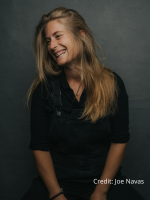Last spring, honeybee keeper Tim Colon of Vineyard Haven emailed me a fascinating recording.
It's called piping and it’s the sound a Queen bee makes when she first hatches. Often there are multiple potential Queens developing at once in a hive, and this sound lets the colony and the other developing queens know that the first one is out of her cell alive.
"It’s kind of like a war cry or it's just like, here I come, I'm going to get you. Or just to let them know that I'm out and I'm strong and I want to be the queen," Tim said.
In Colon’s apiary, Queens piping is the sound of spring. Honeybee hives start multiplying this time of year through a behavior called swarming.
"Just started maybe two weeks ago is swarm season and it's just a natural way for honeybees to split. And when they do that, they raise their own queens and they may raise ten or 15 queens that will leave behind. And, you know, like the old queen goes off with the swarm and then one of those queens that they raised will end up taking over the hive."
Swarming is a pretty fascinating process. Half the worker bees leave with the old queen and go looking for a new home. Meanwhile, back in the hive, eggs laid by the old queen are still developing. Nurse bees feed all fertilized eggs royal jelly for the first three days after they hatch, but then bees destined to become workers are transitioned to a diet of bee bread — basically a mixture of pollen, nectar and honey. And potential queens are fed royal jelly a milk-like superfood secreted by the worker bees — for the rest of their lives. This makes them develop ovaries and grow big and this change in diet is the only difference between a worker bee and a potential queen — it’s all epigenetics. The first queen to mature starts chewing her way out of the cell where she’s been developing.
"The first one out, she would start piping like crazy," Tim explained.
He added, "and the other ones in the cells will actually start like quacking and she will go find them and tear the cells down and sting them and kill, kill each one. She'll go around and another one happens to hatch out while she's busy
killing another one. They'll have, you know, they'll battle it out and eventually there'll be one left."
One queen. Honeybees are eusocial — they do what’s best for the collective, even when this means self-sacrifice. Colon says this is part of what makes beekeeping so fascinating to him.
"I started with a couple of hives, and then the next thing you knew, my kids were selling honey out on the street. And then it just keeps multiplying. And then the last like ten years, I've gotten much more serious about, about it and started really focusing on the queens themselves."
Colon is part of a growing group of small New England beekeepers breeding their own queens. Partly because it’s fun and interesting but partly because it’s a challenging time to be a honeybee keeper — with colony collapse disorder and pesticides and hive pests like varroa mite — paying attention to the genetics of his Queens makes Colon’s hives more resilient.
"So one of the big issues on Martha's Vineyard or even anywhere is that people want to get into beekeeping and they'll order a package of bees and a queen. And those in general, those queens are raised by large beekeeping operations. And yes, you're going to get some decent ones out of it. But in general, the quality is lower than somebody like myself or, you know, small time beekeepers who are raising their queens on their own because they're really looking at, you know, the genetics and how they perform," Tim said.
"And there's a big movement in all of New England where using local queens or queens that are, you know, done by small time beekeepers who have, you know, a couple hundred hives or whatever."
Tim Colon says that since he started breeding his own queens not only has life around the hive gotten nosier and more interesting but his hives have become three times more resilient, less likely to succumb to diseases brought in by pests like varroa mite or a hard winter. So what makes a good queen? Well she keeps a colony that’s hygienic, produces lots of honey and doesn’t sting the beekeeper.
—
Learn more about Tim Colon’s apiary HERE.








